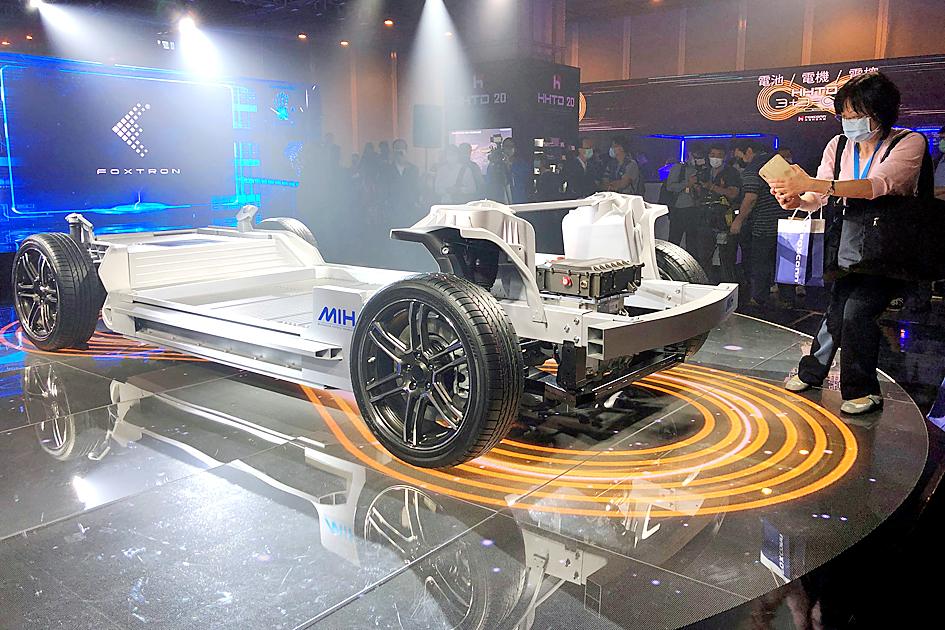Taiwan-based manufacturing giant Hon Hai Industry Precision Co (鴻海精密) is to establish a semiconductor design center in a “smart” industrial park in New Taipei City as part of its effort to develop electric vehicles (EV).
Hon Hai, also known as Foxconn (富士康) globally, said it plans to open a semiconductor design center in the Baogao Science and Intellectual Park in the city’s Sindian District (新店) to develop software used in self-driving, smart connectivity and smart cabins for EV production.
The iPhone assembler said it would hire 250 software engineers for the semiconductor design center in the initial phase of its three-year 1,000-person recruitment program for research and development.

Photo: Reuters
Market analysts said they expect Hon Hai to build an EV cluster in New Taipei City by taking advantage of the new investment in the industrial park.
The industrial park is close to Foxtron Vehicle Technologies Co (鴻華先進), a joint venture between Hon Hai and Taiwanese automaker Yulon Group (裕隆集團) to push for EV development.
Through the venture, Hon Hai is promoting an MIH Open Platform, as the company aims for it to be the “Android of the electric car industry” in its efforts to penetrate the global EV market.
Hon Hai was among six companies that won bids to enter the Sindian industrial park, which together are expected to attract about NT$1.6 billion (US$57.48 million) in investments, the New Taipei City Economic Development Department said.
The department said the city would soon sign agreements with the companies, with an expected start of operations in the 4.2 hectare industrial park in three months.
The department added that it would not know how much Hon Hai plans to spend on its new site before the contract is signed.
Hon Hai will use the Baogao industrial park as a base for next generation smart EV development, the department said.
Hon Hai has in the past few years intensified efforts to carry out its “3 plus 3” initiative, designed to diversify its product offerings, boost profit margins and transform from a contract electronics manufacturer into a company that can integrate its hardware and software strengths.

In Italy’s storied gold-making hubs, jewelers are reworking their designs to trim gold content as they race to blunt the effect of record prices and appeal to shoppers watching their budgets. Gold prices hit a record high on Thursday, surging near US$5,600 an ounce, more than double a year ago as geopolitical concerns and jitters over trade pushed investors toward the safe-haven asset. The rally is putting undue pressure on small artisans as they face mounting demands from customers, including international brands, to produce cheaper items, from signature pieces to wedding rings, according to interviews with four independent jewelers in Italy’s main

Macronix International Co (旺宏), the world’s biggest NOR flash memory supplier, yesterday said it would spend NT$22 billion (US$699.1 million) on capacity expansion this year to increase its production of mid-to-low-density memory chips as the world’s major memorychip suppliers are phasing out the market. The company said its planned capital expenditures are about 11 times higher than the NT$1.8 billion it spent on new facilities and equipment last year. A majority of this year’s outlay would be allocated to step up capacity of multi-level cell (MLC) NAND flash memory chips, which are used in embedded multimedia cards (eMMC), a managed

Japanese Prime Minister Sanae Takaichi has talked up the benefits of a weaker yen in a campaign speech, adopting a tone at odds with her finance ministry, which has refused to rule out any options to counter excessive foreign exchange volatility. Takaichi later softened her stance, saying she did not have a preference for the yen’s direction. “People say the weak yen is bad right now, but for export industries, it’s a major opportunity,” Takaichi said on Saturday at a rally for Liberal Democratic Party candidate Daishiro Yamagiwa in Kanagawa Prefecture ahead of a snap election on Sunday. “Whether it’s selling food or

In the wake of strong global demand for AI applications, Taiwan’s export-oriented economy accelerated with the composite index of economic indicators flashing the first “red” light in December for one year, indicating the economy is in booming mode, the National Development Council (NDC) said yesterday. Moreover, the index of leading indicators, which gauges the potential state of the economy over the next six months, also moved higher in December amid growing optimism over the outlook, the NDC said. In December, the index of economic indicators rose one point from a month earlier to 38, at the lower end of the “red” light.